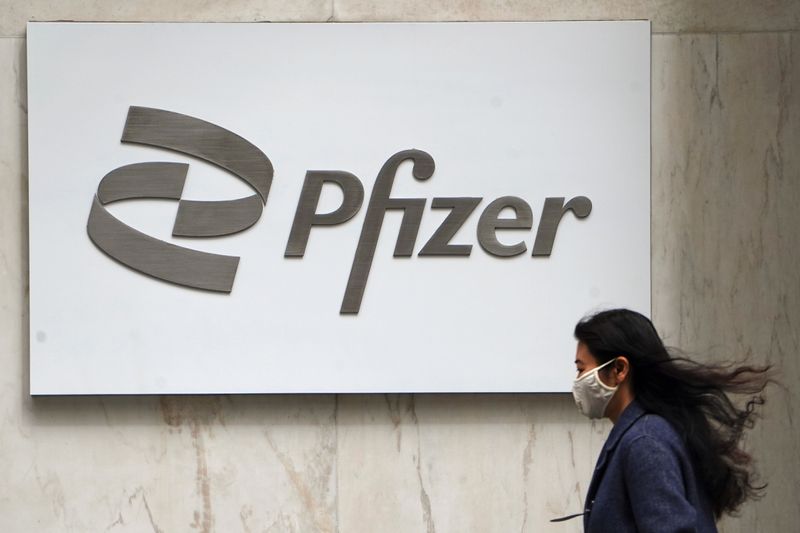This post was originally published on this site
https://i-invdn-com.investing.com/trkd-images/LYNXMPEHBE05G_L.jpg
BRUSSELS (Reuters) – Pfizer (NYSE:PFE) and BioNtech are set to displace AstraZeneca (NASDAQ:AZN) as the main suppliers of COVID-19 vaccines to the global COVAX programme at the start of 2022, a shift that shows the increasing importance of their shot for poorer states.
The expected change comes with headaches for receiving countries that lack sufficient cold storage capacity to handle the Pfizer vaccine, and amid risks of a shortage of syringes needed to administer that shot.
AstraZeneca is currently the most distributed vaccine by COVAX, according to data from Gavi, the vaccine alliance that co-manages the programme with the World Health Organization (WHO).
The programme has so far delivered more than 600 million shots to nearly 150 countries, of which more than 220 million are AstraZeneca’s and about 160 million Pfizer’s.
But in the first quarter of next year Pfizer is set to take over, according to Gavi and WHO figures on doses assigned by the COVAX programme for future supplies.
By the end of March, another 150 million Pfizer doses are to be distributed by COVAX, a WHO document shows.
A spokesperson for Gavi confirmed that Pfizer is far ahead in terms of “allocated” jabs, with about 470 million doses delivered or readied for delivery, against 350 million from AstraZeneca.
Pfizer is the first provider of COVID-19 vaccines to the European Union, the United States and Japan.
It has bilateral agreements for more than 6 billion doses, making it by far the largest supplier of COVID-19 vaccines, according to data from UNICEF, a U.N. agency.
But AstraZeneca has been seen as a crucial supplier to less developed countries, because its shot is cheaper and easier to deliver.
COVAX bet heavily on AstraZeneca at the beginning of the pandemic, but supply problems and export restrictions from top producer India gradually reduced its reliance on the Anglo-Swedish shot.
As the programme faced problems in securing doses directly from vaccine makers amid a global scramble for shots, donations from rich nations became more important, turning Pfizer into the main supplier to COVAX. The United States is donating mostly Pfizer shots to the programme.
COLD CHAIN AND SYRINGES
The change forced Gavi to rush to invest more in cold chain capacity in receiving countries that do not have enough refrigerators and cold transport equipment to handle the Pfizer shot, which requires lower storage temperatures than the AstraZeneca vaccine.
The organization warned about insufficient cold chain capacity in some countries, according to an internal report submitted to Gavi’s board at the beginning of December and seen by Reuters.
The problem is compounded by a risk of shortages of special syringes needed to administer the Pfizer vaccine, Gavi warned in the document.
The Pfizer jab is “the hardest to deliver given ultra-cold chain and special syringe requirements”, Gavi says in its internal document.
It is also “the hardest to plan for as these (donated vaccines) often come with earmarking and little notice or in a staggered manner and in small volumes and with short shelf lives”, the document says.
Wealthy countries donating COVID-19 vaccines with a relatively short shelf life has been a “major problem” for COVAX, a WHO official said last week, as many doses were wasted.
An EU official told a news briefing last week that EU donations of Pfizer vaccines to COVAX were slowed by a lack of syringes. A second official familiar with the issue told Reuters that Gavi had to postpone the delivery of some Pfizer doses from Europe because of the lack of syringes.
Pfizer declined to comment on syringes because it said it does not produce or buy them directly.
As more doses are made available to poorer nations, UNICEF and the WHO have long been warning of the insufficient supply of the auto-disable syringes, which are crucial for inoculations in poorer nations.
Auto-disable syringes lock automatically to prevent re-use, which is otherwise common in poorer nations and could spread of diseases. To make things more complicated, auto-disable syringes needed for the Pfizer vaccine are different from standard syringes, UNICEF said.

